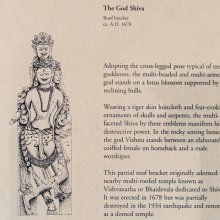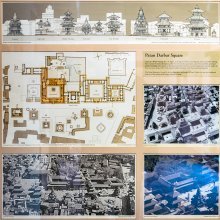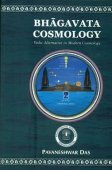Vishvanatha, Viśvanātha, Vishva-natha: 15 definitions
Introduction:
Vishvanatha means something in Hinduism, Sanskrit, the history of ancient India. If you want to know the exact meaning, history, etymology or English translation of this term then check out the descriptions on this page. Add your comment or reference to a book if you want to contribute to this summary article.
The Sanskrit term Viśvanātha can be transliterated into English as Visvanatha or Vishvanatha, using the IAST transliteration scheme (?).
Images (photo gallery)
In Hinduism
Shaivism (Shaiva philosophy)
Source: Wisdom Library: Kubjikāmata-tantraViśvanātha (विश्वनाथ):—Name of the Siddha presiding over the pura named guṇa, which is associated with the fourth seat of the Svādhiṣṭhāna (2nd chakra), named Gola, according to the Kubjikāmata-tantra. These Siddhas are considered to have been the expounders of the kula doctrine in former times.

Shaiva (शैव, śaiva) or Shaivism (śaivism) represents a tradition of Hinduism worshiping Shiva as the supreme being. Closely related to Shaktism, Shaiva literature includes a range of scriptures, including Tantras, while the root of this tradition may be traced back to the ancient Vedas.
Ayurveda (science of life)
Rasashastra (Alchemy and Herbo-Mineral preparations)
Source: Wisdom Library: Rasa-śāstraViśvanātha (विश्वनाथ) is the name of an Ayurvedic recipe defined in the fourth volume of the Rasajalanidhi (chapter 3, atisāra: diarrhoea). These remedies are classified as Iatrochemistry and form part of the ancient Indian science known as Rasaśāstra (medical alchemy). However, as an ayurveda treatment, it should be taken twith caution and in accordance with rules laid down in the texts.
Accordingly, when using such recipes (e.g., viśva-nātha-rasa): “the minerals (uparasa), poisons (viṣa), and other drugs (except herbs), referred to as ingredients of medicines, are to be duly purified and incinerated, as the case may be, in accordance with the processes laid out in the texts.” (see introduction to Iatro chemical medicines)

Āyurveda (आयुर्वेद, ayurveda) is a branch of Indian science dealing with medicine, herbalism, taxology, anatomy, surgery, alchemy and related topics. Traditional practice of Āyurveda in ancient India dates back to at least the first millenium BC. Literature is commonly written in Sanskrit using various poetic metres.
Purana and Itihasa (epic history)
Source: archive.org: Puranic EncyclopediaViśvanātha (विश्वनाथ).—A Sanskrit literary critic who lived in India in the 14th century A.D. Sāhityadarpaṇa is the most important work of this poet of Orissa. This work on criticism in ten chapters, deals with all the aspects of a literary work.
Kuvalayāśvacarita, Raghuvilāsa, Prabhāvatī, Candrakalā, Narasiṃharājavijaya etc. are the other works of this author. Most of these are not yet found. Kuvalayāśvacarita is a poetic work in Prākṛta and Raghuvilāsa is a great poetic work. Prabhāvatī and Candrakalā are dramas. Narasiṃharāja is a historic work.

The Purana (पुराण, purāṇas) refers to Sanskrit literature preserving ancient India’s vast cultural history, including historical legends, religious ceremonies, various arts and sciences. The eighteen mahapuranas total over 400,000 shlokas (metrical couplets) and date to at least several centuries BCE.
Nyaya (school of philosophy)
Source: Shodhganga: A study of Nyāya-vaiśeṣika categoriesViśvanātha (विश्वनाथ) is the author of the Muktāvalī-ullāsa: a commentary on the Bhāṣāpariccheda by Viśvanātha Nyāyapañcānana. The Bhāṣāpariccheda belongs to the syncretic school of Nyāya-Vaiśeṣika. It is known as Kārikāvalī also, on which the author himself has written a commentary called Nyāyasiddhāntamuktāvalī. This work of Viśvanātha has been commented upon by many traditional and modern scholars [viz., by Viśvanātha].

Nyaya (न्याय, nyaya) refers to a school of Hindu philosophy (astika), drawing its subject-matter from the Upanishads. The Nyaya philosophy is known for its theories on logic, methodology and epistemology, however, it is closely related with Vaisheshika in terms of metaphysics.
Shaktism (Shakta philosophy)
Source: Google Books: ManthanabhairavatantramViśvanātha (विश्वनाथ) refers to the “lord of the universe”, according to the Manthānabhairavatantra, a vast sprawling work that belongs to a corpus of Tantric texts concerned with the worship of the goddess Kubjikā. Accordingly, “The goddess of the god was satisfied and went to Śiva’s world in the south, in the eastern mouth. She, the virgin (kumārī) Caṇḍavegā, very powerful and bestowing boons, is there in the seat (called) Pūrṇa [i.e., pūrṇapīṭha] singing the Sāmaveda composed by the most excellent of sages. I salute the master (svāmin), Viśvanātha (the lord of the universe) whose head is placed at the feet of (the goddess) Kubjī and all this in the Dvāpara Age”.

Shakta (शाक्त, śākta) or Shaktism (śāktism) represents a tradition of Hinduism where the Goddess (Devi) is revered and worshipped. Shakta literature includes a range of scriptures, including various Agamas and Tantras, although its roots may be traced back to the Vedas.
India history and geography
Source: Shodhganga: a concise history of Sanskrit Chanda literature (history)Viśvanātha (विश्वनाथ) is the name of a teacher of Gaṅgādharakavi (19th century): the son of Viṭṭhala and Rukmiṇī and also disciple of Viśvanātha, the brother of Candraśekhara. Gaṅgādharakavi was born in a Mahārāṣṭra Brahmin family and migrated to Nagpur from Maṅgrūl village in Buldana district of Berar. He was the contemporary of king Raghujī III and his successor Jānojī. Gaṅgādharakavi composed 14 works and commentaries in Sanskrit. Vṛttacandrikā is the lone work on Prosody.

The history of India traces the identification of countries, villages, towns and other regions of India, as well as mythology, zoology, royal dynasties, rulers, tribes, local festivities and traditions and regional languages. Ancient India enjoyed religious freedom and encourages the path of Dharma, a concept common to Buddhism, Hinduism, and Jainism.
Languages of India and abroad
Sanskrit dictionary
Source: DDSA: The practical Sanskrit-English dictionaryViśvanātha (विश्वनाथ).—lord of the universe, an epithet of Śiva.
Derivable forms: viśvanāthaḥ (विश्वनाथः).
Viśvanātha is a Sanskrit compound consisting of the terms viśva and nātha (नाथ).
Source: Cologne Digital Sanskrit Dictionaries: Shabda-Sagara Sanskrit-English DictionaryViśvanātha (विश्वनाथ).—m.
(-thaḥ) A name of Siva, especially as the object of peculiar adoration at Benares. E. viśva the universe, nātha lord.
Source: Cologne Digital Sanskrit Dictionaries: Benfey Sanskrit-English DictionaryViśvanātha (विश्वनाथ).—m. 1. a name of Śiva. 2. a proper name,
Viśvanātha is a Sanskrit compound consisting of the terms viśva and nātha (नाथ).
Source: Cologne Digital Sanskrit Dictionaries: Cappeller Sanskrit-English DictionaryViśvanātha (विश्वनाथ).—[masculine] lord of the universe; [Epithet] of Śiva, a man’s name.
Source: Cologne Digital Sanskrit Dictionaries: Aufrecht Catalogus Catalogorum1) Viśvanātha (विश्वनाथ) as mentioned in Aufrecht’s Catalogus Catalogorum:—guru of Prabhākara (Śāstradipikā). Hall. p. 181.
2) Viśvanātha (विश्वनाथ):—son of Balabhadra, brother of Govardhanamiśra (Tarkabhāṣāprakāśa) and Padmanābha. W. p. 203.
3) Viśvanātha (विश्वनाथ):—son of Mādhava Bhaṭṭa, grandson of Rāmeśvara Bhaṭṭa, brother of Prabhākara (Rasapradīpa 1583) and Raghunātha. W. p. 228.
4) Viśvanātha (विश्वनाथ):—son of Mādhava, nephew of Nārāyaṇa, brother of Raghunātha (Kālatattvavivecana). L. 1371.
5) Viśvanātha (विश्वनाथ):—father of Dīkṣita Ananta (Mahārudraprayogapaddhati). Burnell. 137^b.
6) Viśvanātha (विश्वनाथ):—father of Jagannātha (Aiṣṭikaikāhikapaddhati 1596). W. p. 52.
7) Viśvanātha (विश्वनाथ):—father of Nārāyaṇācārya and Rāmācārya (Nyāyāmṛtataraṅgiṃ). Hall. p. 113.
8) Viśvanātha (विश्वनाथ):—son of Mudgala Bhaṭṭa Hosiṅga, father of Rāma Bhaṭṭa (Dānaratnākara). Bik. 374.
9) Viśvanātha (विश्वनाथ):—Upadeśasāra.
10) Viśvanātha (विश्वनाथ):—Komalā Ṭīkā.
11) Viśvanātha (विश्वनाथ):—Jātiviveka. L. 3097.
12) Viśvanātha (विश्वनाथ):—wrote for Ḍhuṇḍhi Mahārāja: Ḍhuṇḍhipratāpa [dharma]
13) Viśvanātha (विश्वनाथ):—Tattvacintāmaṇiśabdakhaṇḍaṭīkā.
14) Viśvanātha (विश्वनाथ):—Tarkasaṃgrahaṭīkā.
15) Viśvanātha (विश्वनाथ):—Durbodhabhañjikā Meghadātaṭīkā. Rāghavapāṇḍavīyaṭīkā.
16) Viśvanātha (विश्वनाथ):—Premarasāyana.
17) Viśvanātha (विश्वनाथ):—Muktivādaṭīkā. Vyutpattivādaṭīkā.
18) Viśvanātha (विश्वनाथ):—Rasikarañjinī Kāvyādarśaṭīkā.
19) Viśvanātha (विश्वनाथ):—Rudrapaddhati.
20) Viśvanātha (विश्वनाथ):—Vālmīkitātparyataraṇi Rāmāyaṇaṭīkā.
21) Viśvanātha (विश्वनाथ):—Vidīpadanirṇaya (?).
22) Viśvanātha (विश्वनाथ):—Śrautaprayoga.
23) Viśvanātha (विश्वनाथ):—Saṃgītaraghunandana.
24) Viśvanātha (विश्वनाथ):—Sārasaṃgraha med.
25) Viśvanātha (विश्वनाथ):—called also Saṃgameśvara Bhaṭṭa, son of Gopāla, wrote at Benares in 1736: Vrataprakāśa or Vratarāja.
26) Viśvanātha (विश्वनाथ):—son of Govāla Gomatījñātīya Jyotirvid: Antyeṣṭipaddhati. Antyeṣṭiprayoga. Āśaucatriṃśacchlokīṭīkā. Aurdhvadehikakalpavallī. Aurdhvadehikapaddhati. See Antyeṣṭipaddhati. Kriyāpaddhati. Seems to be identical with the last book.
27) Viśvanātha (विश्वनाथ):—son of Caturbhuja: Vṛttakautuka.
28) Viśvanātha (विश्वनाथ):—son of Nārāyaṇa: Kośakalpataru lex. He mentions the Medinīkośa as one of his sources. Jagatprakāśa kāvya. Śatruśalyacarita kāvya.
29) Viśvanātha (विश्वनाथ):—son of Puruṣottama, composed in 1544: Viśvaprakāśapaddhati Āpast.
30) Viśvanātha (विश्वनाथ):—son of Vāmadeva Bhaṭṭācārya, grandson of Nārāyaṇa Bhaṭṭācārya: Ṣaṭcakravivṛtiṭīkā [tantric]
31) Viśvanātha (विश्वनाथ):—son of Śivarāma Bhaṭṭa: Amṛtalaharī kāvya.
32) Viśvanātha (विश्वनाथ):—son of Śrīpati: Kuṇḍaratnākara and—[commentary].
33) Viśvanātha (विश्वनाथ):—father of Anantadāsa (Sāhityadarpaṇalocana).
34) Viśvanātha (विश्वनाथ):—father of Keśava (Mīmāṃsābālaprakāśaṭīkā).
35) Viśvanātha (विश्वनाथ):—father of Dāmodara (Bhagavatprasādacarita).
36) Viśvanātha (विश्वनाथ):—father of Bhānu Paṇḍita (Sajjanavallabha).
37) Viśvanātha (विश्वनाथ):—father of Rāmacandra (Sabhyābharaṇa).
38) Viśvanātha (विश्वनाथ):—astronomer, quoted by Divākara in Prauḍhamanoramā.
39) Viśvanātha (विश्वनाथ):—Gṛhyasūtraprakāśikā.
40) Viśvanātha (विश्वनाथ):—Jātivivekasaṃgraha.
41) Viśvanātha (विश्वनाथ):—son of Trimalladeva: Sāhityasudhāsindhu.
42) Viśvanātha (विश्वनाथ):—son of Puruṣottama, son of Trivikrama, son of Nārāyaṇa, of the Parāśara gotra. He was a brother of Kṛṣṇa: Viśvaprakāśapaddhati.
43) Viśvanātha (विश्वनाथ):—son of Śrīpati, grandson of Jagannātha: Kuṇḍaratnākara and—[commentary].
44) Viśvanātha (विश्वनाथ):—son of Hari:
—[commentary] on the Vidhānamālā of Nṛsiṃha.
45) Viśvanātha (विश्वनाथ):—Śāntiviveka.
46) Viśvanātha (विश्वनाथ):—son of Jayasiṃhadeva: Rāmacandrāhnika kāvya.
47) Viśvanātha (विश्वनाथ):—son of Narasiṃha, son of Āśādhara, son of Sūryadatta, son of Lakṣmīdhara, son of Muñja, wrote in 1636: Pāraskaragṛhyasūtrabhāṣya.
48) Viśvanātha (विश्वनाथ):—son of Rāma: Vīrasiṃhodayajātaka.
49) Viśvanātha (विश्वनाथ):—son of Lakṣmīdhara: Alaṃkārakulapradīpa.
Viśvanātha has the following synonyms: Viśveśvara.
50) Viśvanātha (विश्वनाथ):—composed his commentary on the Bhāgavatapurāṇa in 1705. He follows the Bengali school of bhakti. Peters. 6 p. 12.
51) Viśvanātha (विश्वनाथ):—with the surname Rāṇada, of the Cittapāvana family: Śambhuvilāsa kāvya.
52) Viśvanātha (विश्वनाथ):—son of Vaidyanātha: Bhāgavatasārasaṃgraha.
53) Viśvanātha (विश्वनाथ):—son of Kamalākara: Jātakapaddhati.
Viśvanātha has the following synonyms: Viśveśvara sūri.
Source: Cologne Digital Sanskrit Dictionaries: Monier-Williams Sanskrit-English Dictionary1) Viśvanātha (विश्वनाथ):—[=viśva-nātha] [from viśva] m. ‘lord of the universe’, Name of Śiva ([especially] as the object of adoration at Benares cf. vśveśa), [Inscriptions]
2) [v.s. ...] of various authors and other men (also with kavi, cakravartin, dīkṣita, daivājña, paṇḍita, miśtra, -rāja, vājapeyin etc.), [Kṣitīśa-vaṃśāvalī-carita; Catalogue(s); Colebrooke]
Source: Cologne Digital Sanskrit Dictionaries: Yates Sanskrit-English DictionaryViśvanātha (विश्वनाथ):—[viśva-nātha] (thaḥ) 1. m. A name of Shiva.
[Sanskrit to German]
Sanskrit, also spelled संस्कृतम् (saṃskṛtam), is an ancient language of India commonly seen as the grandmother of the Indo-European language family (even English!). Closely allied with Prakrit and Pali, Sanskrit is more exhaustive in both grammar and terms and has the most extensive collection of literature in the world, greatly surpassing its sister-languages Greek and Latin.
Kannada-English dictionary
Source: Alar: Kannada-English corpusViśvanātha (ವಿಶ್ವನಾಥ):—[noun] Śiva, the Lord of the entire universe and the presiding deity of Kāśi, holiest city.
Kannada is a Dravidian language (as opposed to the Indo-European language family) mainly spoken in the southwestern region of India.
See also (Relevant definitions)
Partial matches: Natha, Vishva.
Starts with (+18): Vishvanatha acarya, Vishvanatha bhatta, Vishvanatha cakravartin, Vishvanatha caube, Vishvanatha daivajna, Vishvanatha dikshita jade, Vishvanatha kavi, Vishvanatha kaviraja, Vishvanatha mishra, Vishvanatha nyayalamkara, Vishvanatha pancanana bhattacarya, Vishvanatha pandita, Vishvanatha ramanujadasa, Vishvanatha suri, Vishvanatha upadhyaya, Vishvanatha vajapeyin, Vishvanathabhatta, Vishvanathacaritra, Vishvanathacarya, Vishvanathadandibhatta.
Ends with: Kashivishvanatha.
Full-text (+594): Daivajnasharman, Nyayasiddhantapancanana, Kundaratnakara, Shringaravapika, Vishvanathiya, Prashastiratnavali, Vishvanathanagari, Vishvanathanyayalamkara, Vishvanathasuri, Vishvanathasimhadeva, Vishvanathasimha, Vishvanathatajaka, Vishvanathanarayana, Vishvanathacaritra, Vishvanathasena, Vishvanathanagaristotra, Vishvanathastotra, Vishvanathadevaprakasha, Vishvanathopadhyaya, Vishvanathapuri.
Relevant text
Search found 74 books and stories containing Vishvanatha, Viśvanātha, Visvanatha, Vishva-natha, Viśva-nātha, Visva-natha; (plurals include: Vishvanathas, Viśvanāthas, Visvanathas, nathas, nāthas). You can also click to the full overview containing English textual excerpts. Below are direct links for the most relevant articles:
Garga Samhita (English) (by Danavir Goswami)
Verse 2.2.25 < [Chapter 2 - Description of Girirāja Govardhana’s Birth]
Verse 8.13.64 < [Chapter 13 - A Thousand Names of Lord Balarāma]
The history of Andhra country (1000 AD - 1500 AD) (by Yashoda Devi)
Part 37 - Visvanatha (A.D. 1307-1309) < [Chapter XI - The Chalukyas]
Part 35 - Visvanatha (A.D. 1353-1370) < [Chapter XIII - The Dynasties in South Kalinga]
Part 34 - Ganga (A.D. 1300-1353) < [Chapter XIII - The Dynasties in South Kalinga]
Dramaturgy in the Venisamhara (by Debi Prasad Namasudra)
Description of Nāṭaka < [Chapter 2 - Nature and Classification of Sanskrit Drama]
Description of Prakaraṇa < [Chapter 2 - Nature and Classification of Sanskrit Drama]
Abhyāsa: Psuedo-Suggestion < [Chapter 4 - Dramaturgy in Veṇīsaṃhāra]
Bhajana-Rahasya (by Srila Bhaktivinoda Thakura Mahasaya)
Śrī Brahma-Madhva-Gauḍīya Guru-paramparā
Text 13 < [Chapter 5 - Pañcama-yāma-sādhana (Aparāhna-kālīya-bhajana–kṛṣṇa-āsakti)]
Text 22 < [Chapter 6 - Ṣaṣṭha-yāma-sādhana (Sāyaṃ-kālīya-bhajana–bhāva)]
The validity of Anumana (inference) in Nyaya system (by Babu C. D)
Bhagavatpadabhyudaya by Lakshmana Suri (study) (by Lathika M. P.)
Mahākāvyās on Great heroes of Independence struggle < [Chapter 1 - Life and Works of Lakṣmaṇa Sūrin]
The role of Sanskrit Scholars < [Chapter 1 - Life and Works of Lakṣmaṇa Sūrin]
Related products



